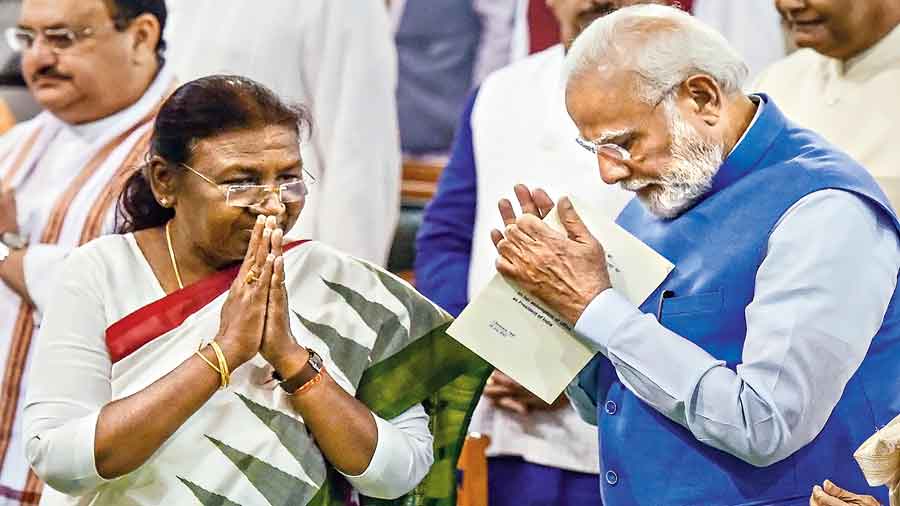Multiple citizens’ and political groups have urged President Droupadi Murmu to nudge the Centre into rescinding new rules that they say take away the right of tribal and traditional forest dwellers to decide the fate of their land in the forests.
The demand, many believe, will put to test Murmu’s advocacy for tribal society and forests in her assumption-of-office address, and has triggered speculation whether she might repeat her act as Jharkhand governor of resisting a policy formulated by a BJP government in the state.
The Campaign for Survival and Dignity (CSD), representing tribal and traditional forest dwellers’ groups from 18 states, has sought Murmu’s intervention for withdrawal of the Forest Conservation Rules 2022 that it has described as “a major assault” on forest dwellers’ rights.
Two days before the letter was sent, the Chhattisgarh Assembly passed a unanimous resolution on July 26 recommending the Centre withdraw the Forest Conservation Rules 2022.
The letter has said, echoing concerns aired by Opposition parties and environmental scientists, that the new rules will effectively eliminate the process of obtaining informed consent from “gram sabhas” — local assemblies of tribal people or forest dwellers — for the diversion of forest land.
“We had written to the environment ministry earlier this month, now we’ve also written to the President. We’re hoping she will intervene,” said Sricharan Behera, a Bhubaneswar-based member of the CSD who has been campaigning for tribal rights for two decades.
The CSD and environmental groups have long viewed the Forest Rights Act, 2006, passed under the UPA government, as a major initiative towards balancing development and forest diversion with the rights of tribal people and traditional forest dwellers.
Scientists estimate that nearly 200 million people across India are directly dependent on forests for their primary livelihood, with around 100 million people living on land classified as forests — roughly 21 per cent of the country’s geographic area.
“The new rules replace the process of obtaining informed consent from the gram sabhas with a decision-making process that involves designated government officers and an advisory committee in the ministry,” said Soma Marla, a biodiversity specialist formerly with the National Bureau of Plant Genetic Resources, a unit of the Indian Council of Agricultural Research.
“The forest bureaucracy (will) control approvals for forest land diversification proposals,” Marla wrote last week in a commentary on the rules that was published in Mainstream.
Marla told The Telegraph: “The rules also violate a 2013 Supreme Court directive that had affirmed the need for gram sabha consent before any forest diversion.”
Murmu had in her assumption-of-office address on July 25 referred to her own roots in tribal society, the “tribal tradition” of living in harmony with nature, and the “importance of forests and water bodies”.
“We take necessary resources of nature and serve nature with equal reverence. This sensitivity has become a global imperative today,” Murmu had said.
The CPI has in a commentary in its publication, New Age, said those words could pose a challenge to most of the socio-economic and ideological positions of the government.
“The government’s move to amend the rules to the forest conservation act may turn into her first point of clash with the political mentors,” the commentary said.
Another sliver of hope some are clinging to is Murmu’s track record. As Jharkhand governor, she had in 2017 resisted the state government’s moves to amend certain tenancy laws that had been opposed by state Opposition parties and tribal rights organisations.
Murmu had returned the proposed amendments to the Chhotanagar Tenancy Act and the Santhal Pargana Tenancy Act, moved by the Raghubar Das government of the BJP.
Behera said the new rules notified in 2022 represented the culmination of a series of obstructions that the Forest Rights Act, 2006, had faced since it was passed.
“Government officials, including forest departments, instead of facilitating the procedures, have obstructed them tooth and nail,” he said. “These new rules will now effectively override provisions in the act.”











